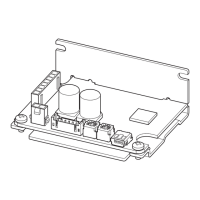15
Connection
6.5 Connecting external analog setting devices
Using an external potentiometer (sold separately), external DC voltage, or PWM signal input, the rotation speed or
torque limiting value can be set.
Using an external potentiometer
Connect to the pin No.6 to No.8 of the CN2.
PAVR2-20K
(sold separately)
21
3
VH
VM
VL
I/O signal connecto
(CN2)
0 to 20 kΩ
Gray
Purple
Blue
8
7
6
When the
PAVR2-20K
is used, use the ferrule (rod terminal).
Manufacturer: PHOENIX CONTACT GmbH & Co. KG
Model: AI 0,14-8 [AWG26 (0.14mm
2
)]
Note
When a shielded cable is used for connection with the external potentiometer, connect shields to VL of the pin No.6
from near the I/O signal connector (CN2).
Using external DC voltage
For the external voltage, use a DC power supply (0 to 5 VDC) with
reinforced insulation on its primary and secondary sides, and
connect to the pin No.6 and No.7 of the CN2.
Input impedance between the VM input and VL input is
approximately 47 k
Ω
.
The VL input is connected to GND inside the driver.
External DC
power supply
0 to 5 VDC
1 mA or more
VM
VL
(CN2)
Purple
Blue
7
6
+
–
Note
•
Be sure to use the voltage of an external control device at 5 VDC or lower.
When connecting an external control device, make sure the polarities are correct. If the polarities are reversed, the
driver may be damaged.
•
When a shielded cable is used for connection with the external control device, connect shields to VL of the pin No.6
from near the I/O signal connector (CN2).
Using PWM signal input
When the operation data is set using the PWM signal input, connect
the PWM signal lines to the pin No.6 and No.7 of the CN2.
Refer to p.47 for details about the PWM signal.
PWM signal
VM
VL
(CN2)
Purple
Blue
7
6
+
–
6.6 Grounding
The wire used to ground the motor and driver must be as thick and short to the grounding point as possible so that no
potential dierence is generated. Choose a large, thick and uniformly conductive surface for the grounding point.
z
Grounding the driver
Install the driver to a metal surface that has grounded.

